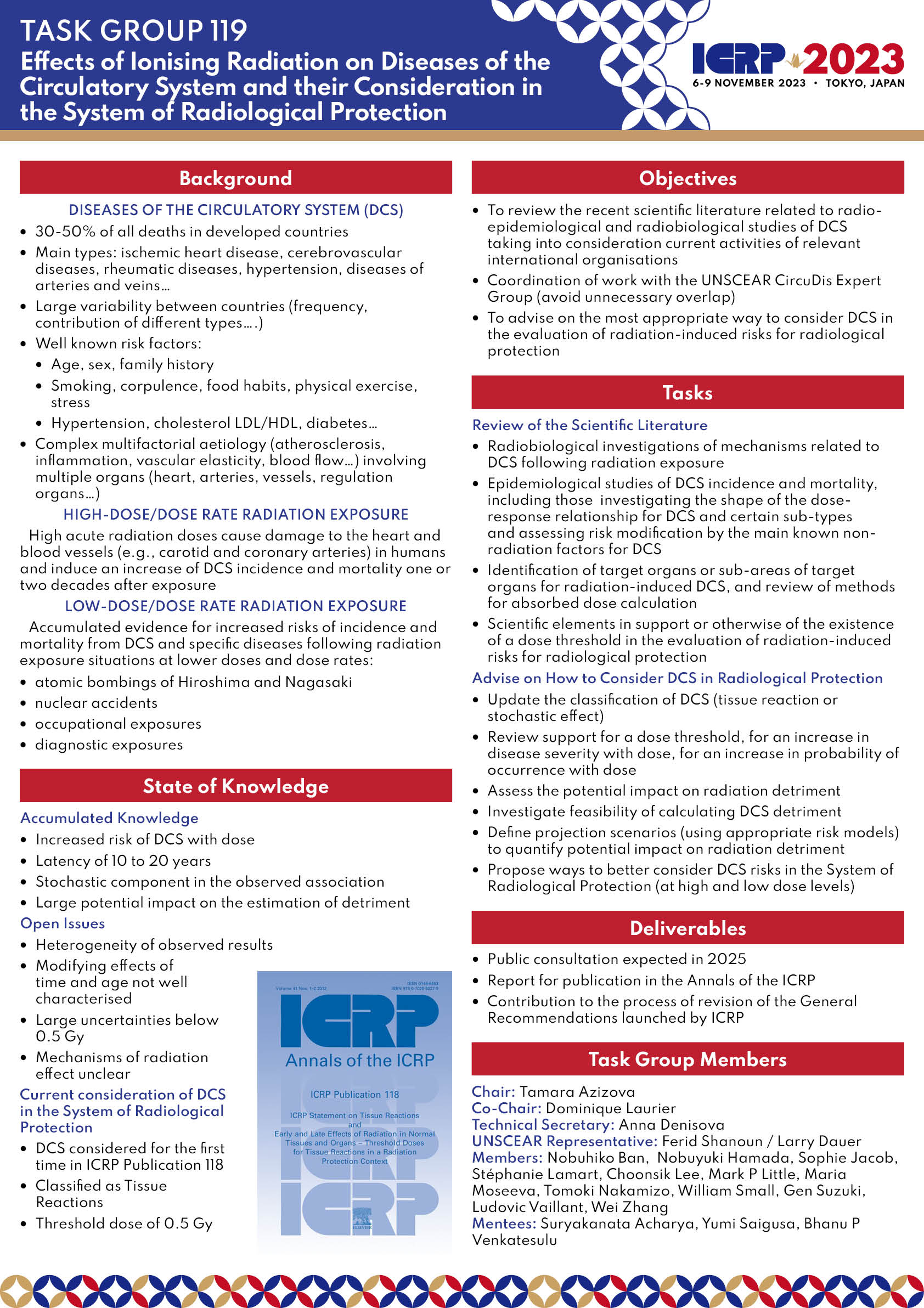Task Group 119
Effects of Ionising Radiation on Diseases of the Circulatory System and their Consideration in the System of Radiological Protection
Under Committee 1
Diseases of the circulatory system (DCS) are the main cause of death and disease burden in many countries. In the ICD-10 classification system, DCS (class 9) includes different groups of conditions damaging the heart and blood vessels: rheumatic diseases, hypertension, ischemic heart disease, cerebrovascular diseases, diseases of arteries and veins. To date, numerous risk factors have been found to contribute to development of DCS. These include non-modifiable biological factors (sex, age, genetic background) and modifiable factors (lifestyle and nutrition, anatomical, metabolic and physiological parameters, environmental factors). It has broadly been established that high acute radiation doses as in radiotherapy cause damage to the heart and blood vessels (e.g., carotid and coronary arteries) in humans and induce an increase of DCS incidence and mortality one or two decades after exposure. Evidence for increased risks of incidence and mortality from DCS and specific diseases following radiation exposure situations at lower doses and dose rates (e.g., at atomic bombings of Hiroshima and Nagasaki, nuclear accidents, occupational exposures, diagnostic exposures) has accumulated over the recent decade. ICRP Publication 118 (2012) classified DCS as tissue reactions, with a suggested threshold due to acute and fractionated/prolonged exposures of 0.5 Gy (absorbed dose to the brain and vessels) for radiological protection purposes. However, it is also acknowledged that there are uncertainties relating to the shape of the dose-response, dose threshold (if there is one), and contribution of other DCS risk factors. It should be noted that despite a lack of fundamental knowledge on mechanisms of radiation-related DCS for exposures at low doses, new publications appear providing insights into the associated underlying biological events. As the baseline rates of incidence/mortality for DCS are high, if radiation increases baseline risk in a multiplicative fashion, small increases in relative risk might imply substantial additional cases of radiation-associated disease.
Deliverables
- review the recent scientific literature related to radio-epidemiological and radiobiological studies of DCS taking into consideration current activities of relevant international organisations;
- provide advice on the evidence available on risk of DCS over all dose levels, including that relating to the existence or otherwise of a threshold;
- provide advice on the dose-rate dependence and radiation quality-dependence of DCS risk and;
- provide advice on how to reflect current knowledge of radiogenic DCS in the system of radiological protection.
The Task Group will prepare a report for publication in Annals of the ICRP that gives a review of literature data on ionising radiation effects on DCS incidence and mortality and provides advice on the most appropriate ways to consider DCS in the evaluation of radiation-induced risks for radiological protection. In addition, the Task Group will develop materials suitable for ICRPÆDIA in collaboration with the Scientific Secretariat.
Progress to date
Task Group has held several online meetings as well as a discussion with the UNSCEAR CircuDis report group. Several topics have been considered this far: classification of DCS and the shape of the dose-response, systematic review and meta-analysis of DCS and ionising radiation, studies in the Mayak workers cohort and the impact of dose rate on DCS risks, mechanisms of DCS, lessons from the nuclear worker studies and A-Bomb survivors studies, high dose medical exposure and dosimetry (with C2 input), the evolution of classification of DCS within the RP system.
ICRP 2023 Poster
Papers
Members of the Task Group have published a number of papers during the development of the work:
| Nobuyuki Hamada (Co-Chair), CRIEPI, Japan | ||
| Dominique Laurier (Co-Chair), French Authority for Nuclear Safety and Radiological Protection (ASNR), France | ||
| Omid Azimzadeh (Member), Federal Office for Radiation Protection, Germany | ||
| Tamara Azizova (Member), Southern Urals Biophysics Institute, Russian Federation | ||
| Nobuhiko Ban (Member), Nuclear Regulation Authority, Japan | ||
| Markus Eidemüller (Member), Federal Office for Radiation Protection (BfS) , Germany | ||
| Sophie Jacob (Member), IRSN, France | ||
| Stephanie Lamart (Member), French Institute for Radiological Protection and Nuclear Safety (IRSN), France | ||
| Choonsik Lee (Member), National Cancer Institute, USA | ||
| Mark P. Little (Member), Oxford Brookes University, United Kingdom | ||
| Maria Moseeva (Member), SUBI, Russian Federation | ||
| Tomoki Nakamizo (Member), RERF, Japan | ||
| William Small (Member), USA | ||
| Gen Suzuki (Member), International University of Health and Welfare, Japan | ||
| Ludovic Vaillant (Member), CEPN, France | ||
| Wei Zhang (Member), PHE, United Kingdom | ||
| Suryakanta Acharya (Member-Mentee), PAY-W Clinic, Assam Cancer Care Foundation, India | ||
| Edilaine Honorio Da Silva (Member-Mentee), Institute of Physics - University of Săo Paulo, Brazil | ||
| Taeeun Kwon (Member-Mentee), National Cancer Institute, USA | ||
| Bhanu Prasad Venkatesulu, (Member-Mentee), India | ||
| Yumi SAIGUSA (Member-Mentee), , USA | ||
| Anna Denisova (Technical Secretary), France |
